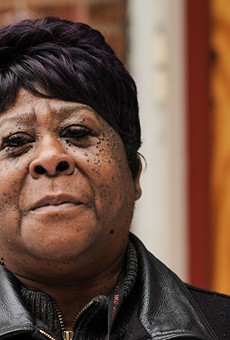As usual, Governor Andrew Cuomo's State of the State speech last week was full of big proposals – seemingly fuller than usual, maybe because he's ready to run for another term, maybe because he has his eye on the White House.
Whatever the reason, Cuomo had a lengthy wish list, packed with a few things he can do on his own and lots that the state legislature will have to agree with. On the whole, it was a strongly progressive list, one that he introduced by focusing on "the old, persistent problems of sexism, racism, and homelessness."

- PHOTO BY JACOB WALSH
- Ryan Acuff: State government is the entity that can best raise money for housing.
He wants the state to enact "a strict, new, uniform code of sexual harassment policies" covering all levels of government. He proposed prohibiting the use of taxpayers' money to settle sexual harassment and misconduct charges against public officials; prohibiting non-disclosure agreements by state and local governments involving sexual harassment cases. He wants state pension funds invested only in companies that have "adequate female and minority representation in management or on the board of directors."
He called for reforms in the state's bail system, which, he said, is "biased against the poor," and for speeding up the criminal justice system. He wants to expand job training for minority youth.
He offered a variety of environmental proposals: ending state pension fund investment in fossil-fuel industries, fighting toxic algae and other pollution-related problems.
The opioid crisis, terrorism, voter registration, protection of collective bargaining, New York City's subway system, pre-kindergarten, middle-class taxes, college costs, downtown revitalization, tourism, the federal tax plan's impact on New Yorkers: Cuomo had proposals addressing all of them.
Rochester would benefit from many of those proposals. In a statement after the speech, City Council members singled out Cuomo's criminal-justice ideas, including bail reform, expedited trials, and stronger programs to help former inmates make the move from incarceration to a productive life. Mayor Lovely Warren praised his focus on homelessness.
Some of the governor's proposals will likely get enough support to pass in New York's fractious state legislature. Others might, if Cuomo dedicates the necessary energy and pressure. But Cuomo doesn't always put enough pressure behind his words.
One area that will require much more than words: the state's growing need for more affordable housing. In his speech, Cuomo noted that the state's problem of homeless has grown worse, and he referred to his time heading the US Housing and Urban Development department in the Clinton administration, putting together a plan "to solve homelessness."
"We always believed that this was a momentary problem," he said, "that it was just an anomaly, that this could not go on." The number of homeless people dropped in many parts of the country, he said, "but now the problem has come back with a vengeance."
The issue hasn't been neglected by the state's housing advocates, who have been pushing for help for homeless people. On the day of Cuomo's State of the State speech, the advocates kicked off a "Housing Justice for All" campaign with a protest in Albany. In an interview after Cuomo's speech, Rochester's Ryan Acuff, an activist with Take Back the Land, said the campaign has three goals: increasing tenants' rights, expanding affordable housing, and fully funding public housing.
On tenants' rights: Tenants in New York City and some downstate counties have basic protections that don't exist here. "We want to level the playing field," Acuff said. "We want to expand all of those protections across the state."
Among them: requiring landlords to have "just cause" for evicting tenants – things like tenants' failure to pay rent or a landlord needing to move into the apartment, Acuff said. The State of New Jersey, for instance, has statewide from arbitrary evictions. "It prevents a lot of abuses and people being displaced," Acuff said.
The housing-justice advocates want Upstate cities to be able to pass rent stabilization laws, something state law permits for New York City and several surrounding counties but not elsewhere.
They also want Rochester to create a housing court – to which tenants could take cases against landlords – as New York City and Buffalo have done. "A lot of people are living in very poor conditions," Acuff said, "and the housing stock is deteriorating." And even though there are laws about habitability and health, tenants have little ability to see that they're enforced, Acuff said.
Acuff and members of the new City-Wide Tenant Union pushed for a housing court at a press conference in Rochester on Monday, calling attention to severe problems in apartments in Southview Towers and a building at 690 Dewey Avenue.
On affordable housing: Cuomo frequently announces a lot of numbers, Acuff said in the interview last week – this many billion for affordable housing – but a lot of it ends up being tax breaks for developers and doesn't benefit the people who need the housing.
One need: "permanent supportive housing" (housing coupled with social services for residents) "focused on people that need it most: people that are homeless or at risk of homeless," Acuff said. "And we need massive, massive amounts."
A good local example of permanently affordable public housing that should be expanded, Acuff said, is Eastman Commons on Dewey Avenue, where low-income residents – some of them referred from homeless shelters – get good, permanent housing and access to social services.
Both the city and Monroe County have formal plans to end homelessness, Acuff said, so there's at least consensus about the need to invest in it. But state government, he said, is the entity that can best raise the money for it.
Another need: preserving the affordable housing that exists. Some of the management contracts for affordable housing expire after 20 or 30 years. After that, Acuff notes, the buildings can become market-rate housing.
Public housing or land trusts, Acuff said, are the way to get the most out of public investment and preserve affordable housing for the long-term. But public housing provided through housing authorities needs to be adequately funded, Acuff said, so that units aren't lost because of maintenance problems.
And the amount of public housing needs to be expanded, he said. Most of the state's money for affordable housing goes to privately owned projects, Acuff said. That needs to change, he said.
Doing what the housing-justice coalition calls for require money – lots of money – and legislative action. And getting the money will be particularly challenging, not only because of the competition from other big-ticket proposals on the governor's wish list but also because of the impact of the Republican tax plan and Trump administration actions on states like New York.
A lot will depend on the governor. "I think if he wants to get these things done, he can make them happen, from the legislative perspective," Acuff said. What the activists hope to do is to highlight "that this is something that can't be ignored anymore," Acuff said. "This is a major crisis all over the state. There's no place, whether New York City or Upstate, that's exempt from this major housing crisis."
